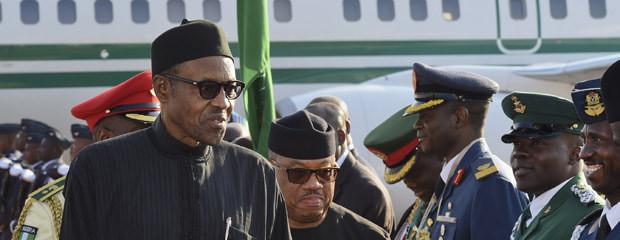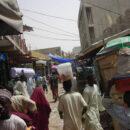Nigeria: Buhari’s government begins to take shape, but it’s not over yet

After a four month wait for the ministerial list, Nigerians can breathe a sigh of relief. However, with the vetting process on the way and political rivalries in the mix, there is still a way to go.

The names of President Muhammadu Buhari’s ministerial candidates are finally public. Photograph by GCIS.
After an agonising four month wait, the highly anticipated list of ministerial nominees was finally read out on the senate floor on Tuesday morning. This came after President Muhammadu Buhari had only just met the deadline for submitting his proposed cabinet last week, relaying 21 names to Senate President Bukola Saraki.
Announced this morning, the ministerial list contains a host of former governors and long-standing political associates of the president. There are no great surprises amongst the names, which include a mix of those seen as career politicians and those seen as steady technocrats.
Many in Nigeria are now issuing a sigh of relief after months of holding their breath. But the wait for these figures to actually start in their positions will go on longer yet – it is not until next week that the Senate will even begin to vet the candidates, and then after that they still need to be approved.
Impatience is not a virtue
The long delay in Buhari’s announcement of his team had previously led many to question the slow pace of government direction, especially as Nigeria faces an economic crisis amidst a 40% fall in global oil prices, the country’s main export.
Buhari has been running the day-to-day activities of government with the help of senior civil servants, but he has drawn the ire of the business community and international investors due to the government’s lack of fiscal direction and policy.
Since his historic election win over Goodluck Jonathan and subsequent swearing in on 29 May, Buhari has gone from “the champion of change” to “baba go slow” with many becoming disillusioned with a government seemly running on auto pilot.
Nevertheless, Buhari does not seem to have been affected by the pressure and argued in a piece for the Washington Post in July that he will not be rushed into appointing a cabinet, arguing “Nigeria must first put new rules of conduct and good governance in place”. Buhari reiterated this point during his Independence Day broadcast recently, describing his approach as “careful and deliberate” whilst telling political observers that “impatience is not a virtue”.
Some such as political analyst Raymond Eyo see why Buhari has had reason to take it slow. “Buhari is a prudent leader, and he apparently sought to properly gauge the extent of the massive systemic rot he inherited before deciding who will best fit which ministry,” he says. However, he adds, “that said, a more pragmatic president should have had in mind possible candidates for cabinet before taking office”.
Better late than never
The long awaited list includes a number of familiar figures. Babatunde Fashola, the celebrated former governor of Lagos who excelled as chairman of the presidential fundraising committee during the election, makes the cut. Kayode Fayemi, the former governor of Ekiti State who led the directorate of policy and strategy of the APC’s Presidential Campaign Council, is also in there.
Meanwhile, other former state leaders on the list include Rotimi Amaechi (Rivers State), Chris Ngige (Anambra) and Ogbonnaya Onu (Abia).
Also amongst the names is Ibe Kachikwu, the Group Managing Director of the Nigerian National Petroleum Corporation (NNPC), who is expected to serve as Minister of State for Petroleum, and Lt-General Abdulrahman Dambazau (rtd), a former chief of army staff and close confidante of the president, who is predicted to head the defence ministry.
Female representation in the Buhari administration has come under intense scrutiny, and may continue with just 3 female nominees: Aisha Alhassan who narrowly lost the Taraba State election in her bid to become Nigeria’s first female governor; Amina Mohammed, former special advisor to the UN secretary-general Ban Ki-Moon; and Kemi Adeosun, former commissioner of finance in Ogun State.
The Saraki factor
As is procedure for potential ministers, the 20 nominated figures will next undergo screening by the senate. This is scheduled to begin on 13 October, but the process might not be smooth sailing due to the frosty relationship that endures between the Senate President Bukola Saraki and the executive arm of government.
Saraki’s election as Senate President went against the wishes of the ruling APC leadership which had settled on Ahmed Lawan as the party’s consensus choice. Saraki, an APC member himself, had to rely on his political dexterity, the assistance of senators belonging to his former party the PDP, and a stroke of good fortune to be elected unopposed against his party’s wishes in a Machiavellian twist.
However, since his election, Saraki has not had it easy. Recently, the Senate President was dramatically brought before the Code of Conduct Tribunal (CCT) accused of false asset declaration during his tenure as governor of Kwara State. Many have interpreted this move as political, and during a senate plenary session last week, Saraki himself asserted: “I have no iota of doubt that I am on trial today because I am the President of the Nigerian Senate against the wishes of some powerful individuals outside this chamber.”
As the case remains unresolved, it is possible Saraki will use the ministerial screening process to antagonise the executive and extract his pound of flesh from his perceived detractors. Indeed, Dino Melaye, the Chairman of the Senate Ad-hoc committee on Publicity and a close Saraki ally, has already sounded a warning to those who expect the ministerial screenings to be merely business as usual, declaring: “The era of take a bow and go are over”.
Fulfilling the promise
Buhari’s final list looks set to contain those who the president believes are clean (or clean enough) and can follow through with his anti-corruption principles. Buhari will blend a mix of APC party faithful with technocrats and will present his cabinet as the best possible team for Nigeria – though allegations of nepotism and sectionalism are still likely to persist.
“Nigeria is yet to find a way to reward party grandees other than offer them appointments and government contracts,” says Ayo Akinfe, writer for London-based Nigerian Watch.
Regardless, when they finally take office, Buhari’s ministers will have plenty of expectation and pressure on their shoulders – especially on the economic front.
“Nigeria’s most immediate challenge is to address its eroded fiscal position and reverse the trend of declining reserves and curtail any further downward pressures on GDP growth,” says Manji Chato, Vice President, West Africa at risk consulting firm Teneo Intelligence.
However, the challenges are many. By appointing himself oil minister, Buhari is aiming to lead from the front in tackling the rot in an industry that provides Nigeria with 95% of its foreign exchange earnings and is the lifeline of Nigerian economy. But other key ministries – such as finance, agriculture, works and transport – will also need to be turned around if ordinary Nigerians are to reap the benefits of democracy too.
Buhari has been slow and careful with his approach thus far and will need to increase his pace to maintain the goodwill of Nigerians. But with the appointments of ministers now in motion, there will be a sigh of relief as the Buhari government finally begins to take shape – “˜begin’ being the operative word.
Lagun Akinloye is a Nigerian journalist and political analyst. Follow him on twitter at @L_Akinloye.
Here’s the full list of the candidates:
1. Rotimi Amaechi
2. Babatunde Fashola
3. Adebayo Shittu
4. Audu Ogbeh
5. Kayode Fayemi
6. Chris Ngige
7. Amina Ibrahim
8. Kemi Adeosun
9. Lai Mohammed
10.Ogbonnaya Onu
11. Ibe Kachikwu
12.Aisha Alhassan
13. Hadi Sirika
14. Udo Udoma
15. Solomon Dalong
16. Ibrahim Usman Jubril
17. Ahmed Musa Ibeto
18. Suleiman Adamu
19. Abubakar Malami
20. Abdulrahman Dambazzau
21. Osagie Ehanire




The list appears to be reflective of the president’s will to be cautious in selecting his cabinet. Most of the names on the list are relatively new in public life, and those who have been in public life among them seem to have something positive about them; an example is the former governor of Lagos State, Tunde Fasola who was an outstanding governor during his regime. What matters at this moment is to consider the individuals as a clean slate and to expect those of them who get approved to follow the president’s idea of transparency, hard work and discipline. Also, the improvement of the common people’s condition of living via the provision of quality education, employment, workable infrastructures like roads, electricity, and portable drinking water ought to be the goal of the cabinet members. This is one way the much publicized change by the president can be meaningful to the common people.
Is still the same corrupt people that he is still bringing ,if he wants to fight corruption let him remove all those old leaders and bring in new once whom have not rule for once to see if they will not do better than the old leaders
List looks good to me. It is obvious the majority on the list has left a good mark one way or the list in their previous public offices. And those of them without prior public service experience have done well enough to be appointed in what is expected to be the ‘ change ‘ cabinet.
I wish them all the best and hope they are up to the difficult task ahead of them.
This list is not bad at all. Let us give time to rule .